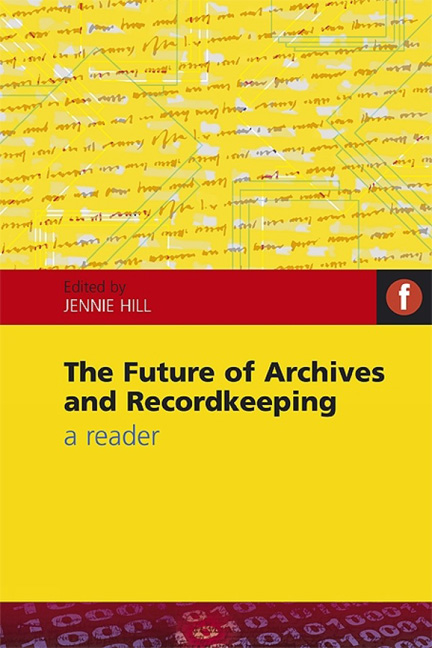Book contents
- Frontmatter
- Dedication
- Contents
- Acknowledgements
- Contributors
- Introduction: seeing the future of archives and recordkeeping
- Part 1 Defining archives
- Part 2 Shaping a discipline
- Part 3 Archive 20: archives in society
- Part 4 Archives in the information age: is there still a role for the archivist?
- Index
- Miscellaneous Endmatter
- Miscellaneous Endmatter
- Miscellaneous Endmatter
Introduction: seeing the future of archives and recordkeeping
Published online by Cambridge University Press: 08 June 2018
- Frontmatter
- Dedication
- Contents
- Acknowledgements
- Contributors
- Introduction: seeing the future of archives and recordkeeping
- Part 1 Defining archives
- Part 2 Shaping a discipline
- Part 3 Archive 20: archives in society
- Part 4 Archives in the information age: is there still a role for the archivist?
- Index
- Miscellaneous Endmatter
- Miscellaneous Endmatter
- Miscellaneous Endmatter
Summary
There has never been a more interesting time to be an archivist. That is something of a grand claim and one which this book hopes to reflect. Archives are moving from a profession predicated on the unquestioning repetition of routine towards a more self-aware, self-reflexive professional outlook, which can only be of benefit to the archival profession.
In the last 50 years there have been a number of changes, both inside and outside of the profession, which have impacted upon the way that archivists work and the way in which we conceive of ourselves, and these themes are echoed in this book. Chief among these themes are the impact of postmodernism on the discipline; the rapid rise of technology and the challenges that this poses for us; the increasing interest in archives outside of the profession and the resulting democratization of archives; and the place of archives within related fields, such as records and information management. It is imperative that archivists engage with these challenges if we are to remain professionally relevant in the 21st century. Each of the contributions to this book engages with one or more of these themes to explore how archivists can respond to these challenges and as a result strengthen the discipline and emerge as a renewed force.
This book is designed as a reader in archives. It is primarily aimed at those studying towards a postgraduate qualification in the subject, but will also be of interest to practitioners and those outside the discipline who wish to gain a deeper understanding of how archival theory and practice has been evolving. It is not intended as a practical guide to professional practice, but rather as a reader around the concepts and themes highlighted above. Each of the chapters question the changes that have taken place in archives since its early theoretical foundations, and how these have occasioned rethinking and revisioning of the archival mission. Although grouped around four core themes, outlined below, there is no expectation that readers will need to follow the specified order. Each chapter represents a defined argument in its own right to enable readers to dip in and out of the collection as they wish. The structure is there to guide readers as to the content of the collection and to highlight chapters that share a common theme.
- Type
- Chapter
- Information
- The Future of Archives and RecordkeepingA reader, pp. 1 - 4Publisher: FacetPrint publication year: 2010



